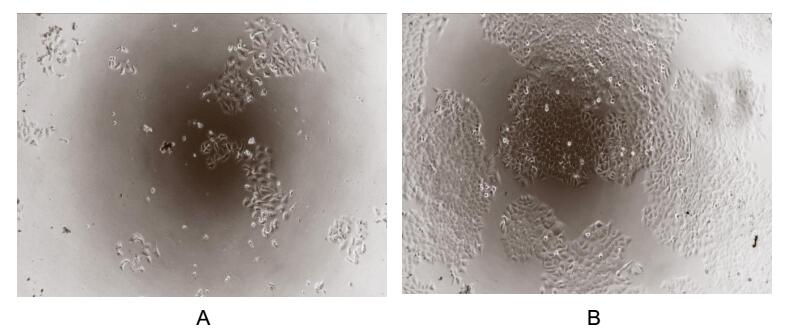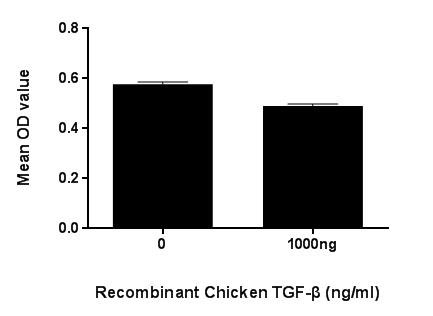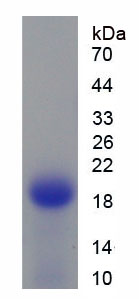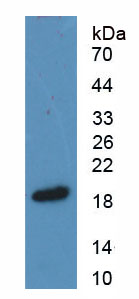Active Transforming Growth Factor Beta 2 (TGFb2) 

TGF-B2; TGF-Beta2; G-TSF; LAP; Cetermin; Polyergin; Latency-associated peptide; BSC-1 cell growth inhibitor; Glioblastoma-derived T-cell suppressor factor
- UOM
- FOB US$ 246.00 US$ 615.00 US$ 1,230.00 US$ 3,690.00 US$ 9,225.00
- Quantity
Overview
Properties
- Product No.APA218Ga01
- Organism SpeciesChicken (Gallus) Same name, Different species.
- ApplicationsCell culture; Activity Assays.
Research use only - DownloadInstruction Manual
- CategoryCytokineInfection immunity
- Buffer FormulationPBS, pH7.4, containing 0.01% SKL, 5% Trehalose.
- Traits Freeze-dried powder, Purity > 90%
- Isoelectric Point8.9
Sign into your account
Share a new citation as an author
Upload your experimental result
Review

Contact us
Please fill in the blank.
Activity test

Transforming growth factor beta (TGF-β) is a multifunctional cytokine belonging to the transforming growth factor superfamily. The TGF-β superfamily includes endogenous growth inhibiting proteins; an increase in expression of TGF-β often correlates with the malignancy of many cancers and a defect in the cellular growth inhibition response to TGF-β. Its immunosuppressive functions then come to dominate, contributing to oncogenesis. To test the effect of TGF-β on inhibit HGF-dependent proliferation, HepG2 cells were seeded into triplicate wells of 96-well plates at a density of 2,000 cells/well and allowed to attach, replaced with serum-free overnight, then the medium was replaced with 2% serum standard DMEM including 1ng/mL HGF prior to the addition of various concentrations of recombinant chicken TGF-β. After incubated for 96h, cells were observed by inverted microscope and cell proliferation was measured by Cell Counting Kit-8 (CCK-8). Briefly, 10µL of CCK-8 solution was added to each well of the plate, then the absorbance at 450nm was measured using a microplate reader after incubating the plate for 1-4 hours at 37℃. The inhibitory effect of TGF-β on HGF-dependent proliferation of HepG2 cells observed by inverted microscope was shown in Figure1. Cell viability was assessed by CCK-8 assay after incubation with recombinant TGF-β for 96h. The result was shown in Figure 2. It was obvious that TGF-β significantly decreased cell viability of HepG2 cells. (A) HepG2 cells cultured in DMEM, stimulated with 1µg/mL TGF-β for 96h; (B) Unstimulated HepG2 cells cultured in DMEM for 96h.
Figure. The inhibitory effect of TGF-β on cell proliferation of HepG2 cells.

Figure. TGF-β inhibit cell proliferation of HepG2 cells.
Usage
Reconstitute in 10mM PBS (pH7.4) to a concentration of 0.1-1.0 mg/mL. Do not vortex.
Storage
Avoid repeated freeze/thaw cycles. Store at 2-8°C for one month. Aliquot and store at -80°C for 12 months.
Stability
The thermal stability is described by the loss rate. The loss rate was determined by accelerated thermal degradation test, that is, incubate the protein at 37°C for 48h, and no obvious degradation and precipitation were observed. The loss rate is less than 5% within the expiration date under appropriate storage condition.
Increment services
-
 BCA Protein Quantification Kit
BCA Protein Quantification Kit
-
 Molecular Mass Marker for Protein
Molecular Mass Marker for Protein
-
 Monoclonal Antibody Customized Service
Monoclonal Antibody Customized Service
-
 Polyclonal Antibody Customized Service
Polyclonal Antibody Customized Service
-
 Protein Activity Test Experiment Service
Protein Activity Test Experiment Service
-
 Electrophoretic Mobility Shift Assay (EMSA) Experiment Service
Electrophoretic Mobility Shift Assay (EMSA) Experiment Service
-
 Buffer
Buffer
-
 Lentivirus Packaging Experiment Service
Lentivirus Packaging Experiment Service
-
 Adenovirus Packaging Experiment Service
Adenovirus Packaging Experiment Service
-
 Real Time PCR Experimental Service
Real Time PCR Experimental Service
-
 Spike RBD Protein (S-RBD)
Spike RBD Protein (S-RBD)
-
 Protein G
Protein G
-
 Protein A
Protein A
Citations
- EVALUATION OF PHYSICO-CHEMICAL PROPERTIES OF COLOSTRUM SUPPLEMENTED DAHIIjfans: Source
- The immunomodulating effect of seminal plasma on T cellsPubMed: 25799173
- Studies on quality attributes of skimmed colostrum powderP-ISSN: 2349–8528
- Angiocrine signals regulate quiescence and therapy resistance in bone metastasisPubmed: 31292293
- Association of CASC18/miR-20a-3p/TGFB2 ceRNA axis with occult lymph node metastasis in tongue squamous cell carcinoma34362313
- Effect of convection and microwave heating on the retention of bioactive components in human milk34896952








